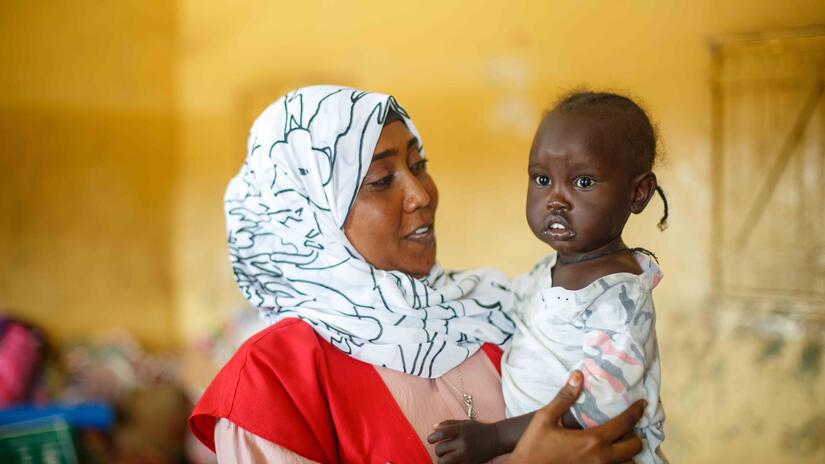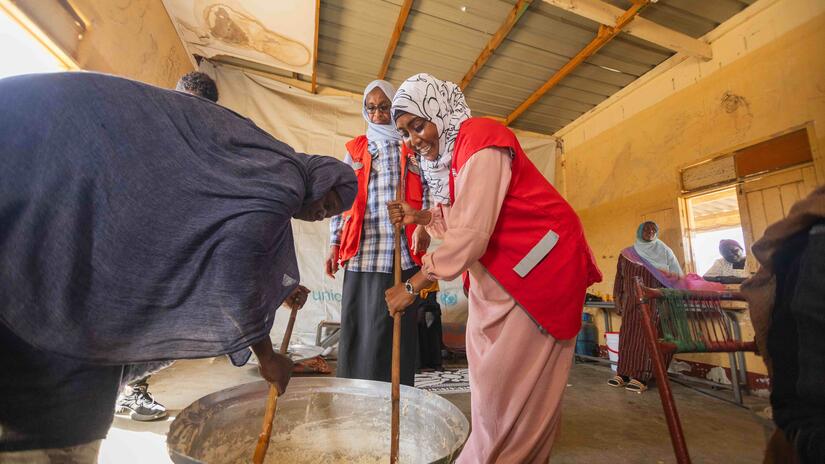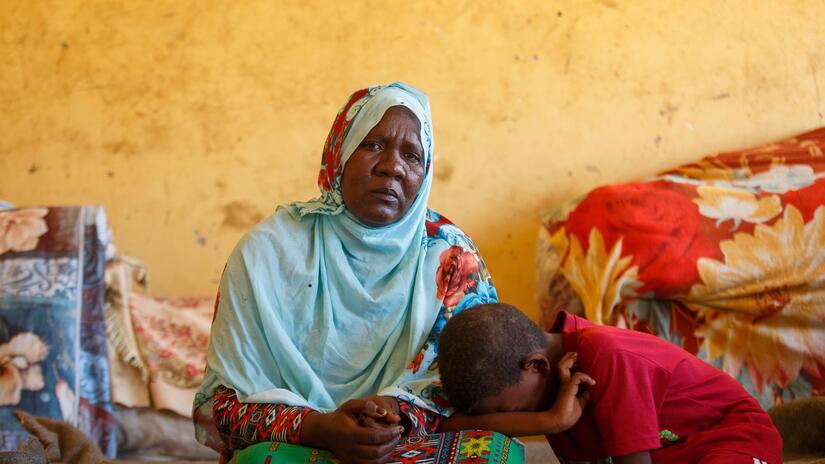One year after the outbreak of violence in Sudan that killed thousands of people and displaced as many as 8.6 million others, the volunteers and staff of the Sudanese Red Crescent Society (SRCS) are still working around the clock with limited resources to meet massive humanitarian needs.
Wajdan Hassan Ahmed has been volunteering with her National Society for 16 years. She describes the 12 months following 15 April 2023 – when residents of the capital Khartoum woke to the terrifying sound of gunfire and explosions – as the most difficult year of her life.
“The stories I experienced at the beginning of the war – the evacuations of people disfigured by bomb shrapnel, the stories of fathers who had lost their daughters, mothers who had lost their children, parents who lost their whole family… all these stories have stayed with me, and I cannot forget them,” she said.

Wajdan Hassan Ahmed, a volunteer with the Sudan Red Crescent Society, holding a young child during a visit at a camp for internally displaced persons in Port Sudan.
Photo: Mohamed al Ibrahimi Ismaldeen/ICRC
Psychosocial support
As well as helping to evacuate people and bring them to safety far away from the fighting, Wajdan and her Red Crescent colleagues have been providing much-needed psychosocial support as well as food, water, and information.
Many families were separated in the panic caused by the violence, and the resulting displacement within and outwith Sudan has pushed people far away from their loved ones. The Sudanese Red Crescent’s Restoring Family Links service is still helping to connect and reunite them.
“We’re working hard to reunite families who have [been separated from] their children,” Wajdan said. “Some are aged seven to ten, and others of different ages.”

SRCS volunteer nurse Wajdan Hassan Ahmed, together with other volunteers and displaced families prepare a meal at a camp for displaced persons, Port Sudan, Sudan.
Photo: Mohamed al Ibrahimi Ismaldeen/ICRC
Health clinics
SRCS teams have also been operating both fixed and mobile health clinics, helping at-risk people to get the care they need, wherever they may be. An estimated 80 per cent of Sudan’s healthcare facilities have stopped functioning since the crisis began, putting intense pressure on existing community-based Red Crescent health services.
As a trusted neutral and impartial organization with thousands of highly trained volunteers and a permanent presence in communities in all 18 States, the SRCS has been at the forefront of the response during this past year. Around 4,000 volunteers have been directly involved in the emergency response.
The IFRC had been working closely with SRCS and the ICRC long before the start of the conflict and will continue to do so for as long as people are in need. Many partner Red Cross and Red Crescent National Societies have also given support, resources and personnel to enhance the response operations. These include National Societies from Denmark, Germany, the Netherlands, Norway, Qatar, Spain, Sweden , Switzerland, and Türkiye.
Underfunded
An Emergency Appeal was launched by IFRC in support of the Sudan Red Crescent Society, although this appeal remains underfunded.
A regional population movement appeal was also launched to help National Societies in Egypt, Chad, South Sudan, Central African Republic, Ethiopia and Libya to support people displaced from Sudan.
Both appeals are critical in providing aid and relief to those affected by the ongoing crisis in Sudan and the surrounding region. More funding is needed to meet the urgent needs of these vulnerable populations.
Call to action
The IFRC and the Sudanese Red Crescent are calling upon all parties in Sudan to reflect on the humanitarian challenges that the conflict has posed. Despite the support that has been mobilized — around 10 per cent of the total required — nothing will be able to fill these gaps if the root causes are not addressed.
The Red Cross and Red Crescent network calls upon all parties to come together for the sake of humanity and for the people, including children, who are suffering due to this ongoing conflict. And it calls on people around the world to support the critical emergency appeals that will help us ensure that affected communities and families can overcome this crisis, now entering its second year.





